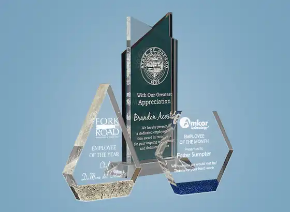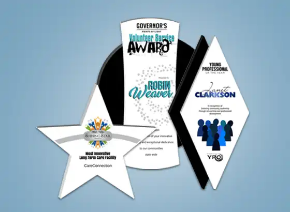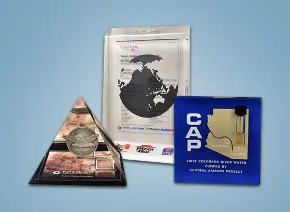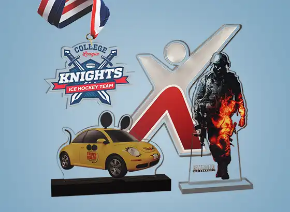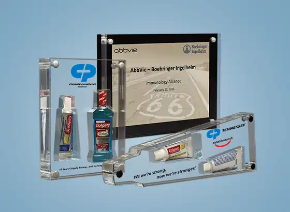
It can be a complex dilemma when you’re trying to figure out if the awards you’re about to purchase are truly ‘Made in the USA’
Consumer confusion and unverified claims in the marketplace make it difficult to ensure seller claims are accurate, and the FTC rules can be complicated and difficult to understand. In this article we’re going to review the ‘Made in the USA’ and ‘Made in America’ statements you may find advertised by the award suppliers you use to recognize your team.
The FTC (Federal Trade Commission) is the basis for the information discussed in this article. For more information on complying with ‘Made in the USA’ claims please visit the FTC website.
First, let’s discuss what the FTC is and what it does.
Charged with preventing deception in the marketplace, the FTC Act gives the Commission the power to bring law enforcement actions against false or misleading claims that a product is of U.S. origin.
Historically the FTC has required that any product claimed as ‘Made in the USA’ be all or virtually all ‘Made in the U.S.’ without exception. And, after a review of its policies, the Commision announced in 1997 that it would retain the ‘all or virtually all’ requirement as it relates to products advertised as U.S. made.

The FTC on labeling ‘Made in the USA’ products
Interestingly enough, the FTC only requires physical labeling of automobiles, textile, wool, and fur products if ‘Made in the USA’ claims are cited. This is where the claims that products sold in the marketplace like trophies and awards labeled as ‘Made in the USA’ or ‘Made in America’ can get dicey.
In an industry where most of the products are imported from China, you’ll find many claims from vendors who state their awards and recognition products are ‘Made in the USA’ – even though they are clearly crossing an ethical line, because in truth they are only decorating in the USA.
That said, there can be a distinct difference between the claim ‘Made in the USA’ and ‘Made in America’ as the statement America technically includes Canada and Mexico which opens the door to the product potentially being manufactured in Mexico, then engraved or UV printed in the U.S.
To what degree does the claim ‘Made in the USA’ apply to marketing materials, both digital and physical?
This is a great question, especially since the FTC does not require physical labeling on products other than those listed above.
The FTC clearly states that both physical and digital channels must comply as they relate to U.S. made claims. This means physical application to printed product labeling, advertising, and promotional materials plus digital outlets including all electronic mechanisms such as internet or email communications.
Entire product line claims
Representing that an entire product line is of U.S. origin such as ‘Our products are made in the USA’ can be a clear violation of FTC standards. This is especially true when only some of the products in the line conform to the ‘all or virtually all’ standards as discussed above.

Who polices ‘Made in the USA’ product claims?
Companies do not need a stamp of blessing from the FTC before making the claim ‘Made in the USA’, nor is there a standard of pre-approval to ensure the products you’re purchasing are in fact U.S. made.
The FTC only states that an advertiser may make any advertising claim, as long as it is in fact the truth and can be substantiated.
So what does that mean to the consumer?
Only that it is the responsibility of the consumer to verify the claim of any company if they are seeking to purchase items that are truly ‘Made in the USA’ in order to ensure validity.
Our suggestion is to ask questions about the manufacturing, where the raw goods come from, and what processes are actually done in the US by American workers. Applying the ‘all or virtually all’ standard is a great way to determine if the claim is actually valid.
What is ‘All or Virtually All’ as it relates to Awards?
Let’s first consider the factors used by the FTC to determine whether a product is ‘all or virtually all’ manufactured in the U.S.
 Final assembly and processing
Final assembly and processing
Must take place in the US and in the case of awards that can apply to physical assembly, gluing, laser engraving, color printing, polishing, packaging, etc.
Each task is essential to the final outcome and presentability of fine corporate awards. US quality being the standard by which few if any other countries can replicate.
 Percentage of costs assigned to U.S. components and processing
Percentage of costs assigned to U.S. components and processing
Here’s where it’s important to take a close look at how far removed any foreign materials or labor are from the finished product.
Sometimes only a small percentage of the raw materials that make up the final outcome of the awards are of origin foreign – for example if the trophy is made of overseas acrylic polymers that must be mixed with a US manufactured monomer, then cast, cut, fabricated, shaped, printed, engraved, assembled, polished, and packaged in the US. The physical material cost when compared to the overall sales price is negligible when compared to actual foreign materials used in manufacturing and thus would qualify as ‘all or virtually all’ by the FTC guidelines.
How Raw Materials factor into ‘Made in the USA’
The Federal Trade Commision provides a very good example of how raw materials should be factored into the ‘all or virtually all’ standard of U.S. made goods.
We’ve modified the example here to represent the material cost vs. the labor to manufacture cost in relation to a gold ring with foreign minerals compared to a cast acrylic deal toy, with each using U.S. labor to fabricate and prepare for distribution.



Gold Ring
With gold today at $1940 per oz and the average men’s ring using between 3 and 9 grams of gold, the physical material cost in a 5 gram gold ring costs approximately $880 dollars US. If imported, the disparity between foreign material cost and U.S. labor cost to produce could render the ring as deceptive if the manufacturer claims it is ‘all or virtually all’ Made in the USA.
Essentially, the material cost of the gold supersedes the labor cost to produce it.
Lucite® Embedment
However in the case of a cast Lucite® embedment, the industry standard material for financial tombstones and deal toy awards, only a small portion of the total material costs may be of foreign origin. The two main ingredients in cast acrylic are liquid acrylic monomer which is manufactured in the US and the powdered acrylic polymer which originates from Mitsubishi Chemical in Japan.
Each of these ingredients is a significantly small percentage compared to the overall manufacturing and labor cost to produce an embedment when you look at what is involved to cast, cure, surface plane, fabricate, edge, laser engrave, and polish.
In this case the embedded acrylic awards would qualify as an ‘all or virtually all’ Made in the USA product.
Key takeaways if ‘Made in the USA’ is important to your purchasing decision
- Review the FTC guidelines on what the commision would actually classify as ‘Made in the USA’
- Ask suppliers to validate their ‘Made in the USA’ claim with proof by explaining where their raw materials come from and to what percentage are they actually manufactured in the U.S.
- Read customer reviews to get an understanding of the company you’re considering. Reviews will often reveal discrepancies in ‘Made in the USA’ claims by referencing delays in delivery due to inability to acquire goods.

About US Acrylic Awards and our ‘Made in the USA’ status
We are a manufacturer of fine corporate acrylic awards, deal toys, and financial tombstones – manufactured in the United States of ‘all or virtually all’ materials and labor as required by the FTC to make the claim.
Based in Glendale, Arizona we have been delivering fine recognition products to corporations throughout the US and Canada since 1984. If ensuring the awards you use to recognize your team are produced by American hands, in a US factory is important to you, we’re here to help you recognize your best with the best!
Written by noptim… unleash the power

